Nursing Assignment: Leadership in Healthcare Settings
VerifiedAdded on 2023/06/04
|11
|3847
|134
Report
AI Summary
This report delves into the realm of nursing leadership, specifically focusing on transformational leadership. It begins by introducing the concept of leadership styles, highlighting the significance of leadership approaches in enhancing the quality of healthcare settings. The report then explores transformational leadership in depth, discussing its positive impacts, including fostering healthy relationships, enhancing decision-making skills, and improving patient outcomes. The report also examines the models of transformational leadership, particularly the 4 I's: idealized influence, inspirational motivation, intellectual stimulation, and individual consideration. Furthermore, the report evaluates the impact of transformational leadership on various aspects of nursing, such as communication, documentation, and conflict management, and emphasizes its contribution to effective quality care. The report concludes by highlighting the opportunities transformational leadership offers to nurses for professional development and enhanced job satisfaction. The report draws on academic sources and provides examples from clinical practice to support its findings.
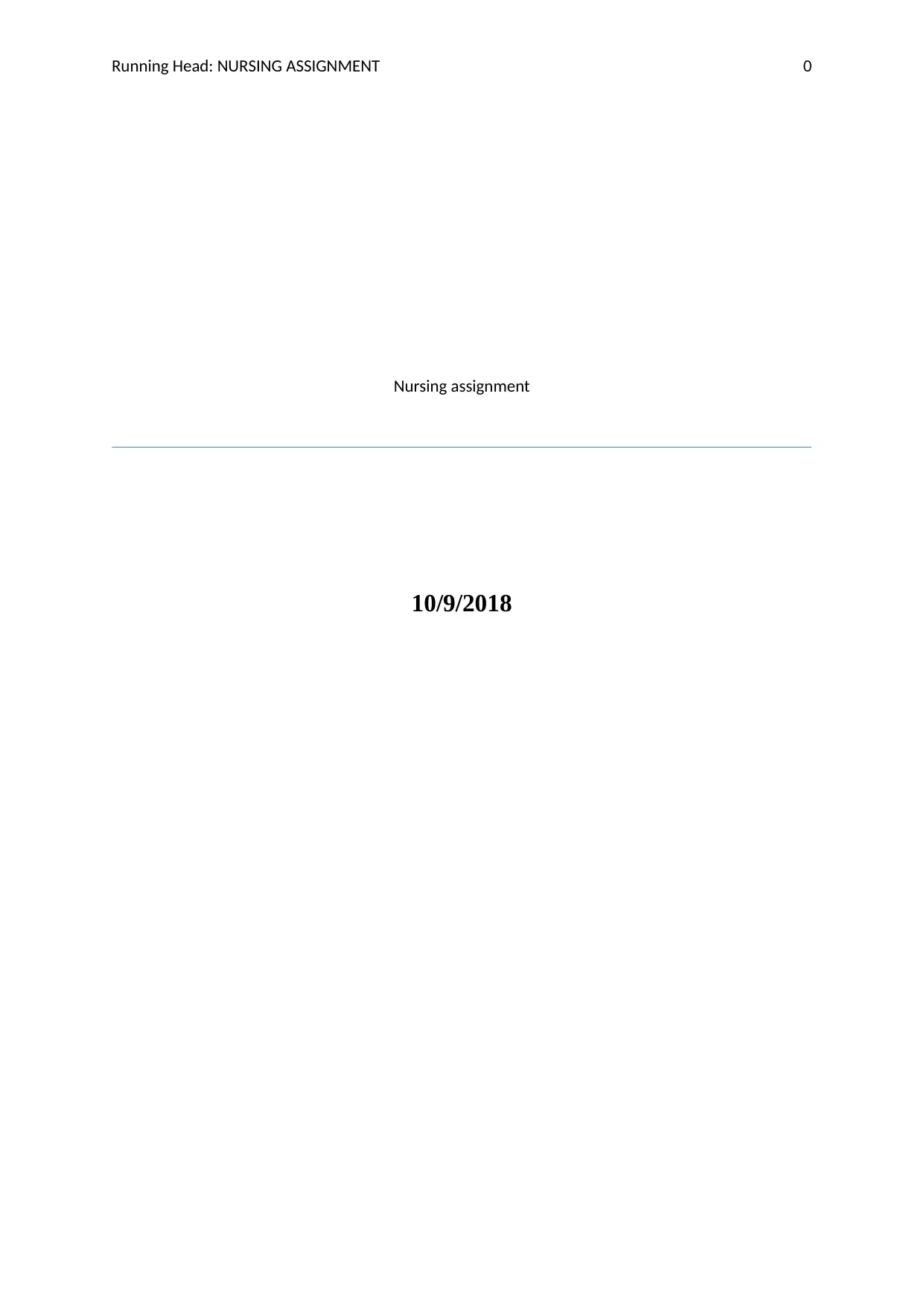
Running Head: NURSING ASSIGNMENT 0
Nursing assignment
10/9/2018
Nursing assignment
10/9/2018
Paraphrase This Document
Need a fresh take? Get an instant paraphrase of this document with our AI Paraphraser
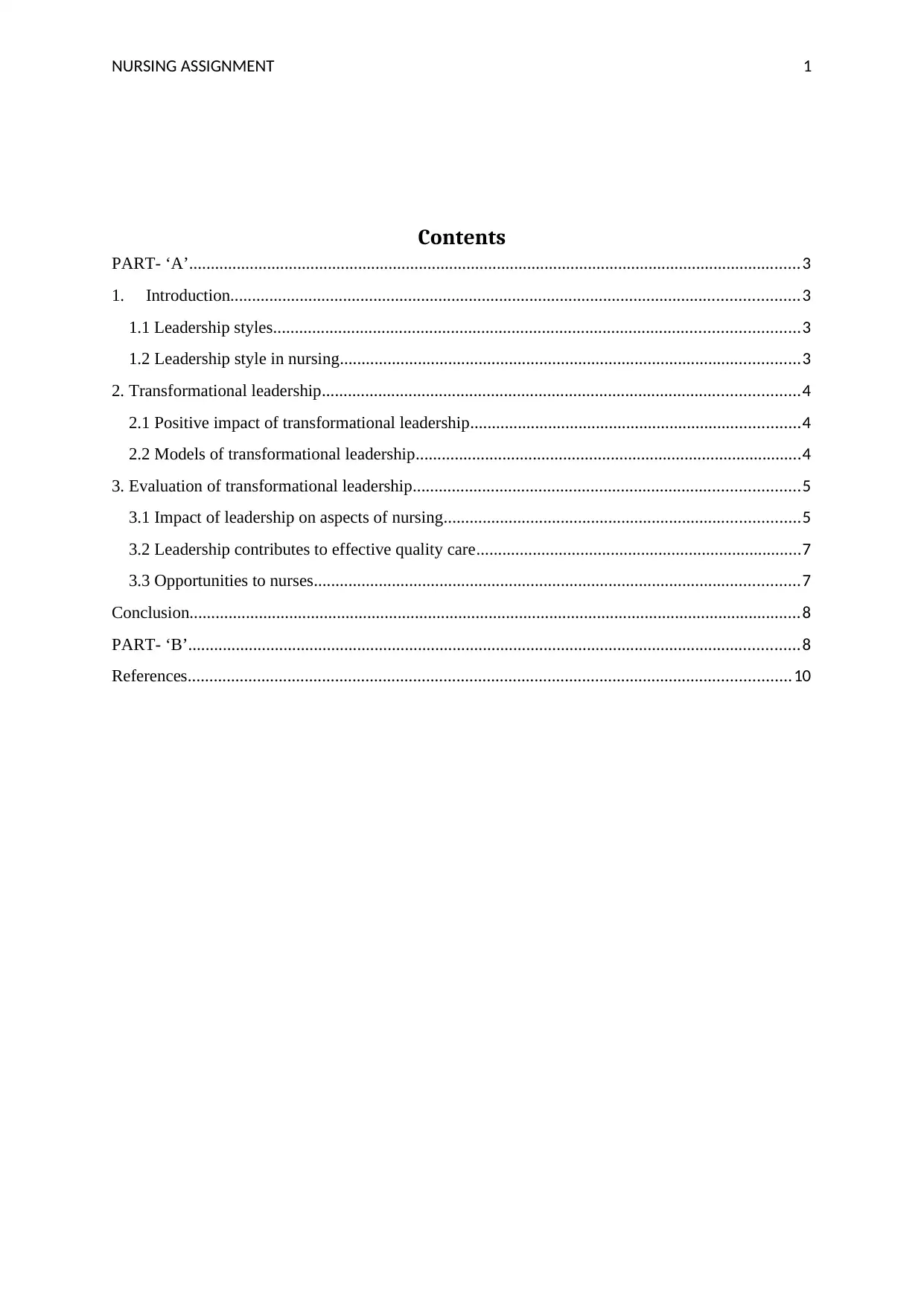
NURSING ASSIGNMENT 1
Contents
PART- ‘A’.............................................................................................................................................3
1. Introduction...................................................................................................................................3
1.1 Leadership styles.........................................................................................................................3
1.2 Leadership style in nursing..........................................................................................................3
2. Transformational leadership..............................................................................................................4
2.1 Positive impact of transformational leadership............................................................................4
2.2 Models of transformational leadership.........................................................................................4
3. Evaluation of transformational leadership.........................................................................................5
3.1 Impact of leadership on aspects of nursing..................................................................................5
3.2 Leadership contributes to effective quality care...........................................................................7
3.3 Opportunities to nurses................................................................................................................7
Conclusion.............................................................................................................................................8
PART- ‘B’.............................................................................................................................................8
References...........................................................................................................................................10
Contents
PART- ‘A’.............................................................................................................................................3
1. Introduction...................................................................................................................................3
1.1 Leadership styles.........................................................................................................................3
1.2 Leadership style in nursing..........................................................................................................3
2. Transformational leadership..............................................................................................................4
2.1 Positive impact of transformational leadership............................................................................4
2.2 Models of transformational leadership.........................................................................................4
3. Evaluation of transformational leadership.........................................................................................5
3.1 Impact of leadership on aspects of nursing..................................................................................5
3.2 Leadership contributes to effective quality care...........................................................................7
3.3 Opportunities to nurses................................................................................................................7
Conclusion.............................................................................................................................................8
PART- ‘B’.............................................................................................................................................8
References...........................................................................................................................................10
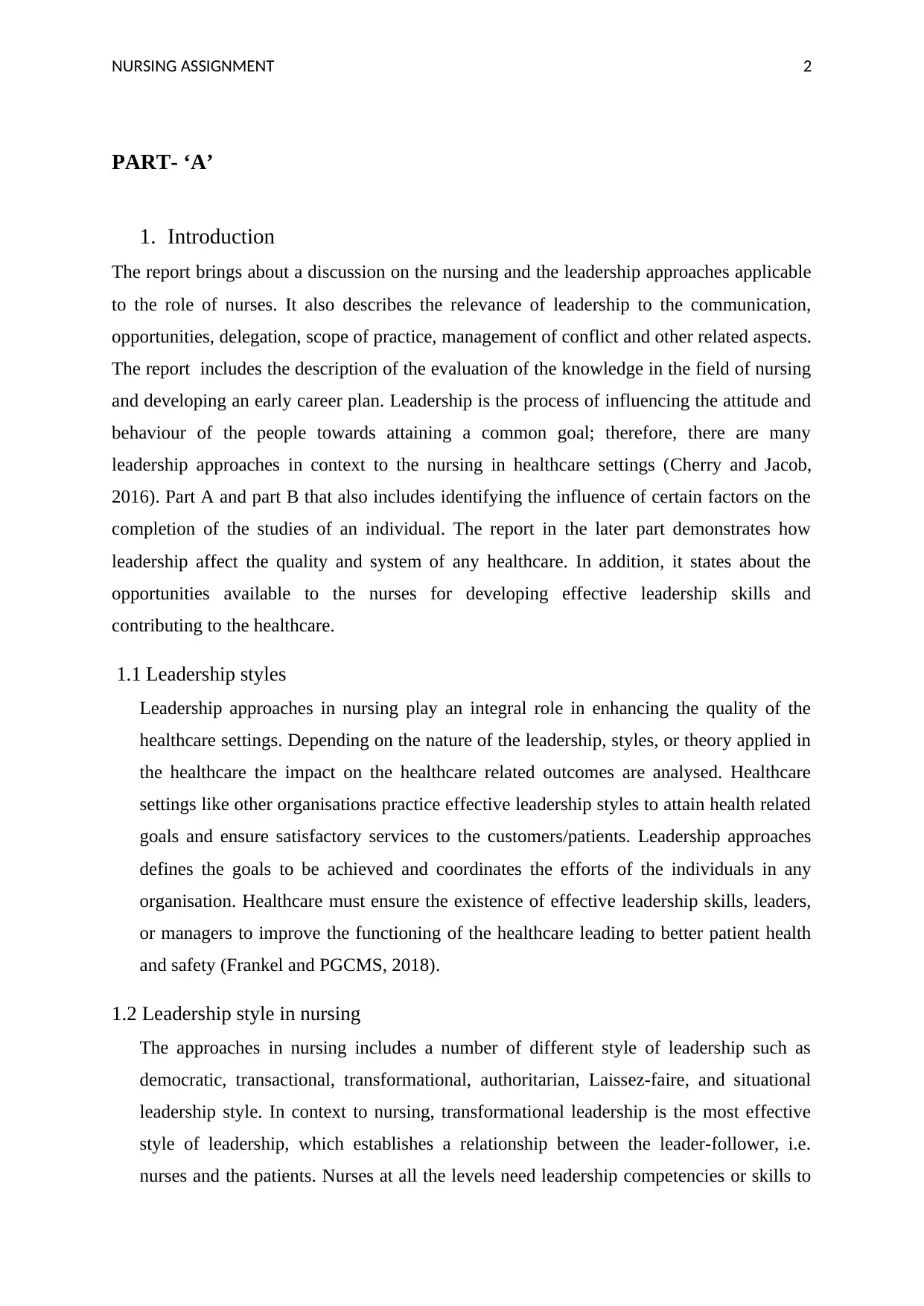
NURSING ASSIGNMENT 2
PART- ‘A’
1. Introduction
The report brings about a discussion on the nursing and the leadership approaches applicable
to the role of nurses. It also describes the relevance of leadership to the communication,
opportunities, delegation, scope of practice, management of conflict and other related aspects.
The report includes the description of the evaluation of the knowledge in the field of nursing
and developing an early career plan. Leadership is the process of influencing the attitude and
behaviour of the people towards attaining a common goal; therefore, there are many
leadership approaches in context to the nursing in healthcare settings (Cherry and Jacob,
2016). Part A and part B that also includes identifying the influence of certain factors on the
completion of the studies of an individual. The report in the later part demonstrates how
leadership affect the quality and system of any healthcare. In addition, it states about the
opportunities available to the nurses for developing effective leadership skills and
contributing to the healthcare.
1.1 Leadership styles
Leadership approaches in nursing play an integral role in enhancing the quality of the
healthcare settings. Depending on the nature of the leadership, styles, or theory applied in
the healthcare the impact on the healthcare related outcomes are analysed. Healthcare
settings like other organisations practice effective leadership styles to attain health related
goals and ensure satisfactory services to the customers/patients. Leadership approaches
defines the goals to be achieved and coordinates the efforts of the individuals in any
organisation. Healthcare must ensure the existence of effective leadership skills, leaders,
or managers to improve the functioning of the healthcare leading to better patient health
and safety (Frankel and PGCMS, 2018).
1.2 Leadership style in nursing
The approaches in nursing includes a number of different style of leadership such as
democratic, transactional, transformational, authoritarian, Laissez-faire, and situational
leadership style. In context to nursing, transformational leadership is the most effective
style of leadership, which establishes a relationship between the leader-follower, i.e.
nurses and the patients. Nurses at all the levels need leadership competencies or skills to
PART- ‘A’
1. Introduction
The report brings about a discussion on the nursing and the leadership approaches applicable
to the role of nurses. It also describes the relevance of leadership to the communication,
opportunities, delegation, scope of practice, management of conflict and other related aspects.
The report includes the description of the evaluation of the knowledge in the field of nursing
and developing an early career plan. Leadership is the process of influencing the attitude and
behaviour of the people towards attaining a common goal; therefore, there are many
leadership approaches in context to the nursing in healthcare settings (Cherry and Jacob,
2016). Part A and part B that also includes identifying the influence of certain factors on the
completion of the studies of an individual. The report in the later part demonstrates how
leadership affect the quality and system of any healthcare. In addition, it states about the
opportunities available to the nurses for developing effective leadership skills and
contributing to the healthcare.
1.1 Leadership styles
Leadership approaches in nursing play an integral role in enhancing the quality of the
healthcare settings. Depending on the nature of the leadership, styles, or theory applied in
the healthcare the impact on the healthcare related outcomes are analysed. Healthcare
settings like other organisations practice effective leadership styles to attain health related
goals and ensure satisfactory services to the customers/patients. Leadership approaches
defines the goals to be achieved and coordinates the efforts of the individuals in any
organisation. Healthcare must ensure the existence of effective leadership skills, leaders,
or managers to improve the functioning of the healthcare leading to better patient health
and safety (Frankel and PGCMS, 2018).
1.2 Leadership style in nursing
The approaches in nursing includes a number of different style of leadership such as
democratic, transactional, transformational, authoritarian, Laissez-faire, and situational
leadership style. In context to nursing, transformational leadership is the most effective
style of leadership, which establishes a relationship between the leader-follower, i.e.
nurses and the patients. Nurses at all the levels need leadership competencies or skills to
⊘ This is a preview!⊘
Do you want full access?
Subscribe today to unlock all pages.

Trusted by 1+ million students worldwide
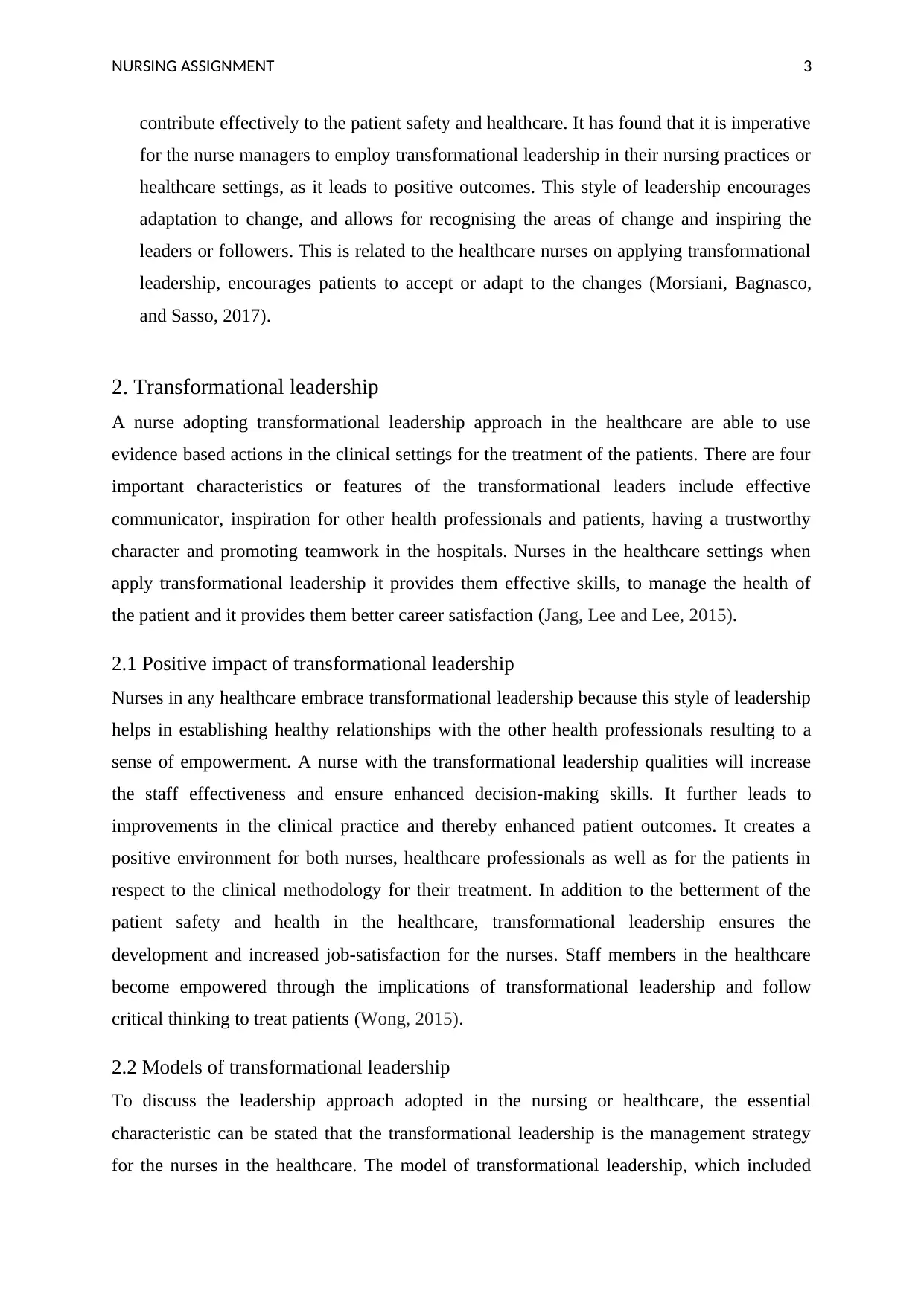
NURSING ASSIGNMENT 3
contribute effectively to the patient safety and healthcare. It has found that it is imperative
for the nurse managers to employ transformational leadership in their nursing practices or
healthcare settings, as it leads to positive outcomes. This style of leadership encourages
adaptation to change, and allows for recognising the areas of change and inspiring the
leaders or followers. This is related to the healthcare nurses on applying transformational
leadership, encourages patients to accept or adapt to the changes (Morsiani, Bagnasco,
and Sasso, 2017).
2. Transformational leadership
A nurse adopting transformational leadership approach in the healthcare are able to use
evidence based actions in the clinical settings for the treatment of the patients. There are four
important characteristics or features of the transformational leaders include effective
communicator, inspiration for other health professionals and patients, having a trustworthy
character and promoting teamwork in the hospitals. Nurses in the healthcare settings when
apply transformational leadership it provides them effective skills, to manage the health of
the patient and it provides them better career satisfaction (Jang, Lee and Lee, 2015).
2.1 Positive impact of transformational leadership
Nurses in any healthcare embrace transformational leadership because this style of leadership
helps in establishing healthy relationships with the other health professionals resulting to a
sense of empowerment. A nurse with the transformational leadership qualities will increase
the staff effectiveness and ensure enhanced decision-making skills. It further leads to
improvements in the clinical practice and thereby enhanced patient outcomes. It creates a
positive environment for both nurses, healthcare professionals as well as for the patients in
respect to the clinical methodology for their treatment. In addition to the betterment of the
patient safety and health in the healthcare, transformational leadership ensures the
development and increased job-satisfaction for the nurses. Staff members in the healthcare
become empowered through the implications of transformational leadership and follow
critical thinking to treat patients (Wong, 2015).
2.2 Models of transformational leadership
To discuss the leadership approach adopted in the nursing or healthcare, the essential
characteristic can be stated that the transformational leadership is the management strategy
for the nurses in the healthcare. The model of transformational leadership, which included
contribute effectively to the patient safety and healthcare. It has found that it is imperative
for the nurse managers to employ transformational leadership in their nursing practices or
healthcare settings, as it leads to positive outcomes. This style of leadership encourages
adaptation to change, and allows for recognising the areas of change and inspiring the
leaders or followers. This is related to the healthcare nurses on applying transformational
leadership, encourages patients to accept or adapt to the changes (Morsiani, Bagnasco,
and Sasso, 2017).
2. Transformational leadership
A nurse adopting transformational leadership approach in the healthcare are able to use
evidence based actions in the clinical settings for the treatment of the patients. There are four
important characteristics or features of the transformational leaders include effective
communicator, inspiration for other health professionals and patients, having a trustworthy
character and promoting teamwork in the hospitals. Nurses in the healthcare settings when
apply transformational leadership it provides them effective skills, to manage the health of
the patient and it provides them better career satisfaction (Jang, Lee and Lee, 2015).
2.1 Positive impact of transformational leadership
Nurses in any healthcare embrace transformational leadership because this style of leadership
helps in establishing healthy relationships with the other health professionals resulting to a
sense of empowerment. A nurse with the transformational leadership qualities will increase
the staff effectiveness and ensure enhanced decision-making skills. It further leads to
improvements in the clinical practice and thereby enhanced patient outcomes. It creates a
positive environment for both nurses, healthcare professionals as well as for the patients in
respect to the clinical methodology for their treatment. In addition to the betterment of the
patient safety and health in the healthcare, transformational leadership ensures the
development and increased job-satisfaction for the nurses. Staff members in the healthcare
become empowered through the implications of transformational leadership and follow
critical thinking to treat patients (Wong, 2015).
2.2 Models of transformational leadership
To discuss the leadership approach adopted in the nursing or healthcare, the essential
characteristic can be stated that the transformational leadership is the management strategy
for the nurses in the healthcare. The model of transformational leadership, which included
Paraphrase This Document
Need a fresh take? Get an instant paraphrase of this document with our AI Paraphraser
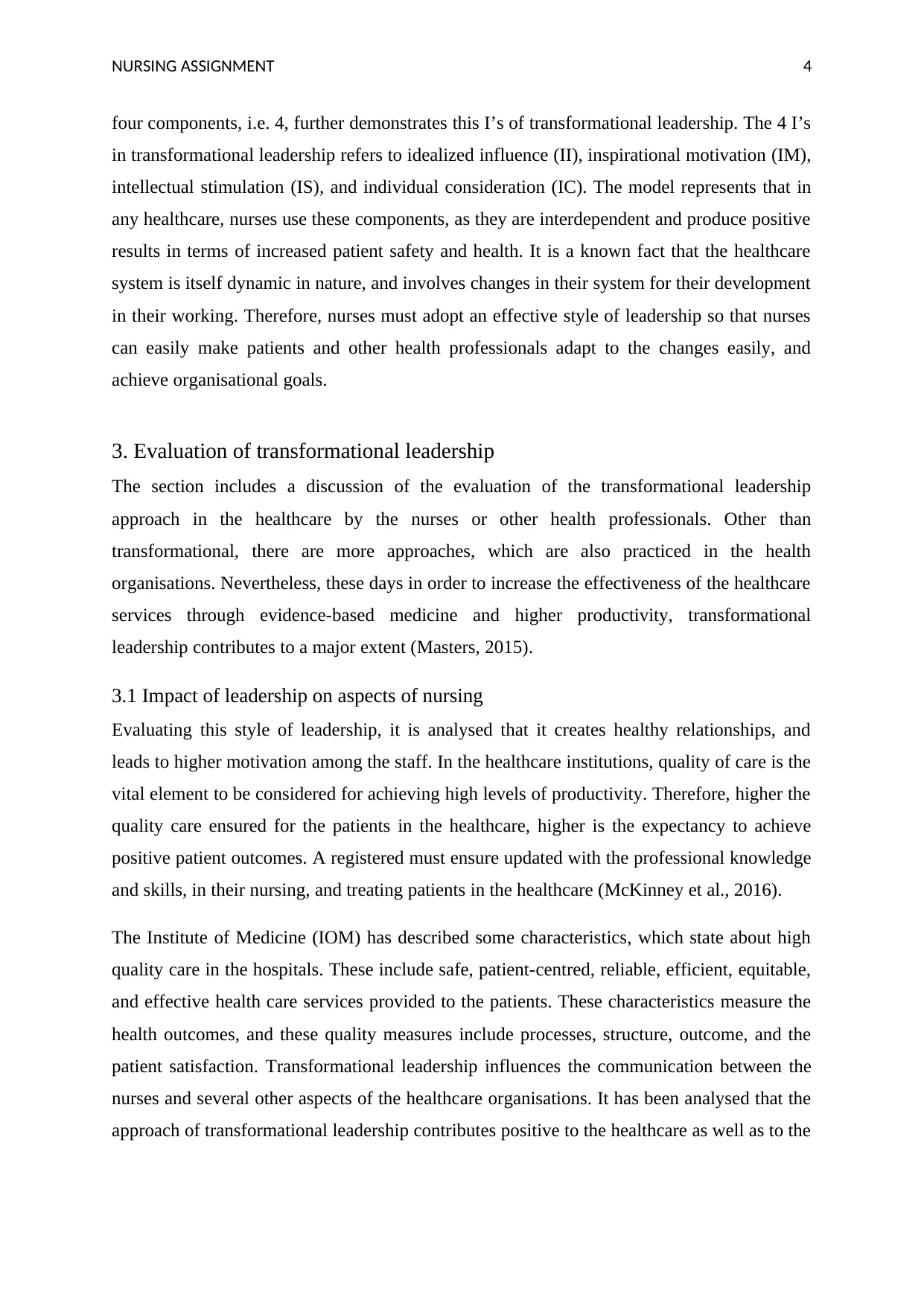
NURSING ASSIGNMENT 4
four components, i.e. 4, further demonstrates this I’s of transformational leadership. The 4 I’s
in transformational leadership refers to idealized influence (II), inspirational motivation (IM),
intellectual stimulation (IS), and individual consideration (IC). The model represents that in
any healthcare, nurses use these components, as they are interdependent and produce positive
results in terms of increased patient safety and health. It is a known fact that the healthcare
system is itself dynamic in nature, and involves changes in their system for their development
in their working. Therefore, nurses must adopt an effective style of leadership so that nurses
can easily make patients and other health professionals adapt to the changes easily, and
achieve organisational goals.
3. Evaluation of transformational leadership
The section includes a discussion of the evaluation of the transformational leadership
approach in the healthcare by the nurses or other health professionals. Other than
transformational, there are more approaches, which are also practiced in the health
organisations. Nevertheless, these days in order to increase the effectiveness of the healthcare
services through evidence-based medicine and higher productivity, transformational
leadership contributes to a major extent (Masters, 2015).
3.1 Impact of leadership on aspects of nursing
Evaluating this style of leadership, it is analysed that it creates healthy relationships, and
leads to higher motivation among the staff. In the healthcare institutions, quality of care is the
vital element to be considered for achieving high levels of productivity. Therefore, higher the
quality care ensured for the patients in the healthcare, higher is the expectancy to achieve
positive patient outcomes. A registered must ensure updated with the professional knowledge
and skills, in their nursing, and treating patients in the healthcare (McKinney et al., 2016).
The Institute of Medicine (IOM) has described some characteristics, which state about high
quality care in the hospitals. These include safe, patient-centred, reliable, efficient, equitable,
and effective health care services provided to the patients. These characteristics measure the
health outcomes, and these quality measures include processes, structure, outcome, and the
patient satisfaction. Transformational leadership influences the communication between the
nurses and several other aspects of the healthcare organisations. It has been analysed that the
approach of transformational leadership contributes positive to the healthcare as well as to the
four components, i.e. 4, further demonstrates this I’s of transformational leadership. The 4 I’s
in transformational leadership refers to idealized influence (II), inspirational motivation (IM),
intellectual stimulation (IS), and individual consideration (IC). The model represents that in
any healthcare, nurses use these components, as they are interdependent and produce positive
results in terms of increased patient safety and health. It is a known fact that the healthcare
system is itself dynamic in nature, and involves changes in their system for their development
in their working. Therefore, nurses must adopt an effective style of leadership so that nurses
can easily make patients and other health professionals adapt to the changes easily, and
achieve organisational goals.
3. Evaluation of transformational leadership
The section includes a discussion of the evaluation of the transformational leadership
approach in the healthcare by the nurses or other health professionals. Other than
transformational, there are more approaches, which are also practiced in the health
organisations. Nevertheless, these days in order to increase the effectiveness of the healthcare
services through evidence-based medicine and higher productivity, transformational
leadership contributes to a major extent (Masters, 2015).
3.1 Impact of leadership on aspects of nursing
Evaluating this style of leadership, it is analysed that it creates healthy relationships, and
leads to higher motivation among the staff. In the healthcare institutions, quality of care is the
vital element to be considered for achieving high levels of productivity. Therefore, higher the
quality care ensured for the patients in the healthcare, higher is the expectancy to achieve
positive patient outcomes. A registered must ensure updated with the professional knowledge
and skills, in their nursing, and treating patients in the healthcare (McKinney et al., 2016).
The Institute of Medicine (IOM) has described some characteristics, which state about high
quality care in the hospitals. These include safe, patient-centred, reliable, efficient, equitable,
and effective health care services provided to the patients. These characteristics measure the
health outcomes, and these quality measures include processes, structure, outcome, and the
patient satisfaction. Transformational leadership influences the communication between the
nurses and several other aspects of the healthcare organisations. It has been analysed that the
approach of transformational leadership contributes positive to the healthcare as well as to the
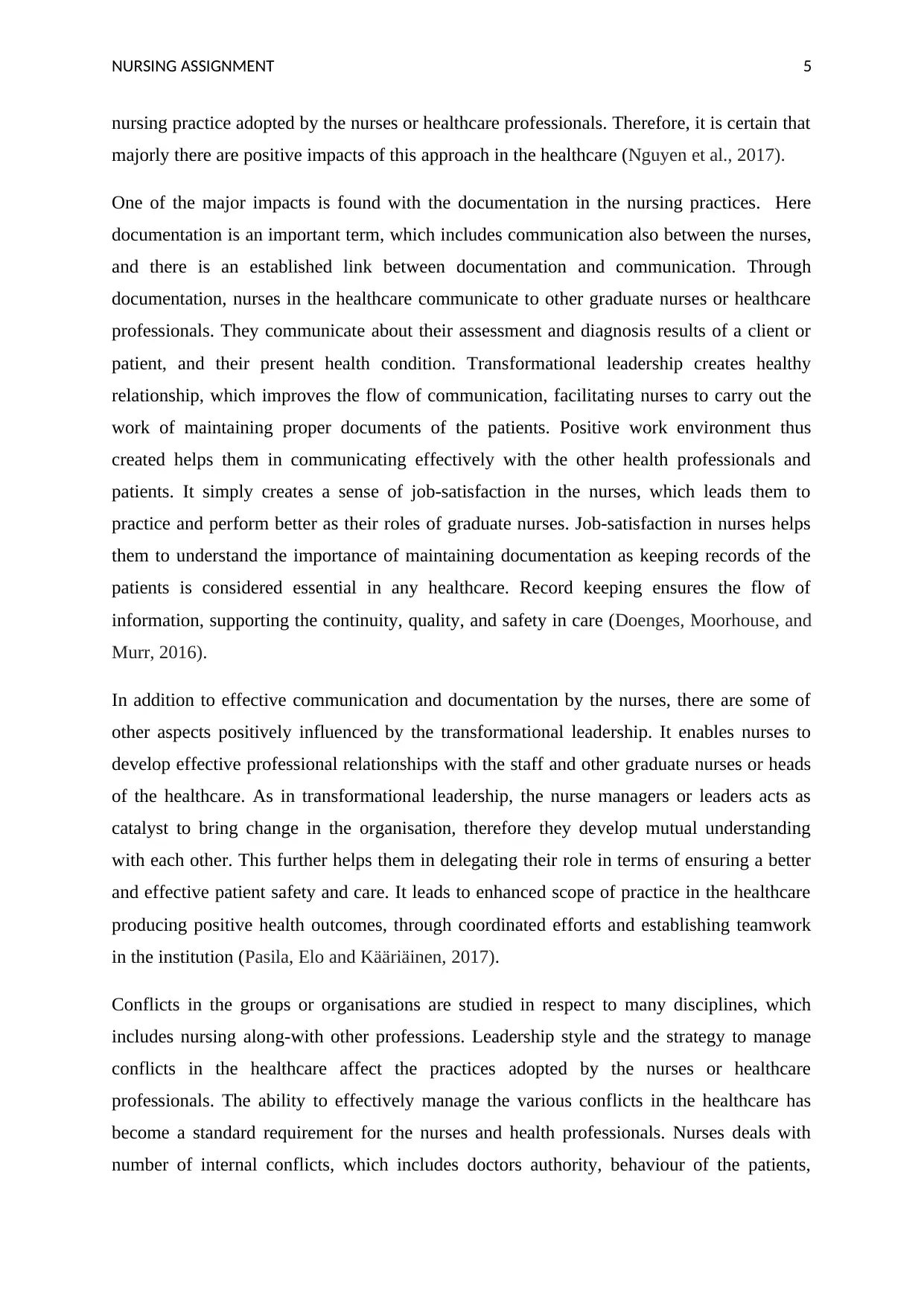
NURSING ASSIGNMENT 5
nursing practice adopted by the nurses or healthcare professionals. Therefore, it is certain that
majorly there are positive impacts of this approach in the healthcare (Nguyen et al., 2017).
One of the major impacts is found with the documentation in the nursing practices. Here
documentation is an important term, which includes communication also between the nurses,
and there is an established link between documentation and communication. Through
documentation, nurses in the healthcare communicate to other graduate nurses or healthcare
professionals. They communicate about their assessment and diagnosis results of a client or
patient, and their present health condition. Transformational leadership creates healthy
relationship, which improves the flow of communication, facilitating nurses to carry out the
work of maintaining proper documents of the patients. Positive work environment thus
created helps them in communicating effectively with the other health professionals and
patients. It simply creates a sense of job-satisfaction in the nurses, which leads them to
practice and perform better as their roles of graduate nurses. Job-satisfaction in nurses helps
them to understand the importance of maintaining documentation as keeping records of the
patients is considered essential in any healthcare. Record keeping ensures the flow of
information, supporting the continuity, quality, and safety in care (Doenges, Moorhouse, and
Murr, 2016).
In addition to effective communication and documentation by the nurses, there are some of
other aspects positively influenced by the transformational leadership. It enables nurses to
develop effective professional relationships with the staff and other graduate nurses or heads
of the healthcare. As in transformational leadership, the nurse managers or leaders acts as
catalyst to bring change in the organisation, therefore they develop mutual understanding
with each other. This further helps them in delegating their role in terms of ensuring a better
and effective patient safety and care. It leads to enhanced scope of practice in the healthcare
producing positive health outcomes, through coordinated efforts and establishing teamwork
in the institution (Pasila, Elo and Kääriäinen, 2017).
Conflicts in the groups or organisations are studied in respect to many disciplines, which
includes nursing along-with other professions. Leadership style and the strategy to manage
conflicts in the healthcare affect the practices adopted by the nurses or healthcare
professionals. The ability to effectively manage the various conflicts in the healthcare has
become a standard requirement for the nurses and health professionals. Nurses deals with
number of internal conflicts, which includes doctors authority, behaviour of the patients,
nursing practice adopted by the nurses or healthcare professionals. Therefore, it is certain that
majorly there are positive impacts of this approach in the healthcare (Nguyen et al., 2017).
One of the major impacts is found with the documentation in the nursing practices. Here
documentation is an important term, which includes communication also between the nurses,
and there is an established link between documentation and communication. Through
documentation, nurses in the healthcare communicate to other graduate nurses or healthcare
professionals. They communicate about their assessment and diagnosis results of a client or
patient, and their present health condition. Transformational leadership creates healthy
relationship, which improves the flow of communication, facilitating nurses to carry out the
work of maintaining proper documents of the patients. Positive work environment thus
created helps them in communicating effectively with the other health professionals and
patients. It simply creates a sense of job-satisfaction in the nurses, which leads them to
practice and perform better as their roles of graduate nurses. Job-satisfaction in nurses helps
them to understand the importance of maintaining documentation as keeping records of the
patients is considered essential in any healthcare. Record keeping ensures the flow of
information, supporting the continuity, quality, and safety in care (Doenges, Moorhouse, and
Murr, 2016).
In addition to effective communication and documentation by the nurses, there are some of
other aspects positively influenced by the transformational leadership. It enables nurses to
develop effective professional relationships with the staff and other graduate nurses or heads
of the healthcare. As in transformational leadership, the nurse managers or leaders acts as
catalyst to bring change in the organisation, therefore they develop mutual understanding
with each other. This further helps them in delegating their role in terms of ensuring a better
and effective patient safety and care. It leads to enhanced scope of practice in the healthcare
producing positive health outcomes, through coordinated efforts and establishing teamwork
in the institution (Pasila, Elo and Kääriäinen, 2017).
Conflicts in the groups or organisations are studied in respect to many disciplines, which
includes nursing along-with other professions. Leadership style and the strategy to manage
conflicts in the healthcare affect the practices adopted by the nurses or healthcare
professionals. The ability to effectively manage the various conflicts in the healthcare has
become a standard requirement for the nurses and health professionals. Nurses deals with
number of internal conflicts, which includes doctors authority, behaviour of the patients,
⊘ This is a preview!⊘
Do you want full access?
Subscribe today to unlock all pages.

Trusted by 1+ million students worldwide
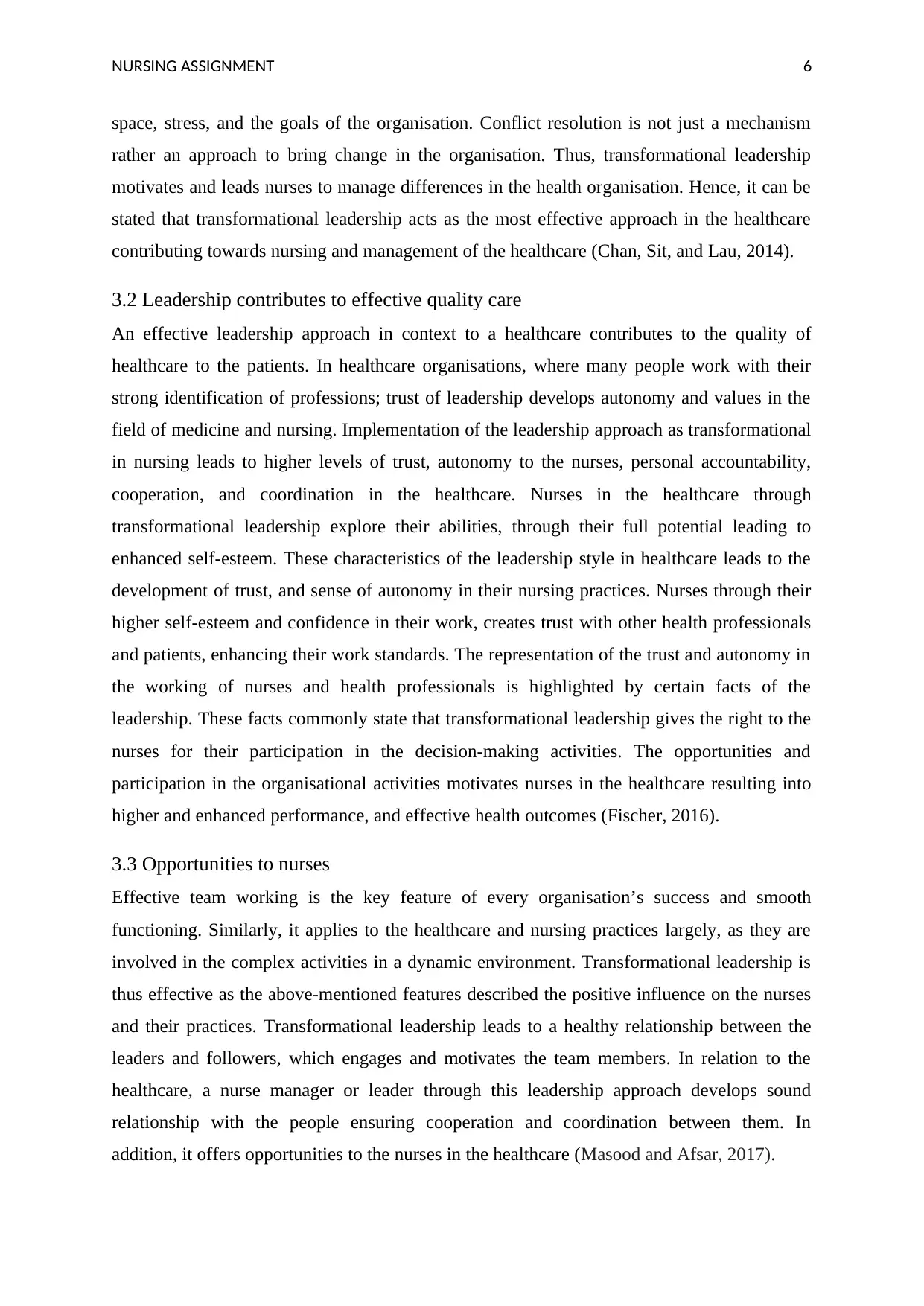
NURSING ASSIGNMENT 6
space, stress, and the goals of the organisation. Conflict resolution is not just a mechanism
rather an approach to bring change in the organisation. Thus, transformational leadership
motivates and leads nurses to manage differences in the health organisation. Hence, it can be
stated that transformational leadership acts as the most effective approach in the healthcare
contributing towards nursing and management of the healthcare (Chan, Sit, and Lau, 2014).
3.2 Leadership contributes to effective quality care
An effective leadership approach in context to a healthcare contributes to the quality of
healthcare to the patients. In healthcare organisations, where many people work with their
strong identification of professions; trust of leadership develops autonomy and values in the
field of medicine and nursing. Implementation of the leadership approach as transformational
in nursing leads to higher levels of trust, autonomy to the nurses, personal accountability,
cooperation, and coordination in the healthcare. Nurses in the healthcare through
transformational leadership explore their abilities, through their full potential leading to
enhanced self-esteem. These characteristics of the leadership style in healthcare leads to the
development of trust, and sense of autonomy in their nursing practices. Nurses through their
higher self-esteem and confidence in their work, creates trust with other health professionals
and patients, enhancing their work standards. The representation of the trust and autonomy in
the working of nurses and health professionals is highlighted by certain facts of the
leadership. These facts commonly state that transformational leadership gives the right to the
nurses for their participation in the decision-making activities. The opportunities and
participation in the organisational activities motivates nurses in the healthcare resulting into
higher and enhanced performance, and effective health outcomes (Fischer, 2016).
3.3 Opportunities to nurses
Effective team working is the key feature of every organisation’s success and smooth
functioning. Similarly, it applies to the healthcare and nursing practices largely, as they are
involved in the complex activities in a dynamic environment. Transformational leadership is
thus effective as the above-mentioned features described the positive influence on the nurses
and their practices. Transformational leadership leads to a healthy relationship between the
leaders and followers, which engages and motivates the team members. In relation to the
healthcare, a nurse manager or leader through this leadership approach develops sound
relationship with the people ensuring cooperation and coordination between them. In
addition, it offers opportunities to the nurses in the healthcare (Masood and Afsar, 2017).
space, stress, and the goals of the organisation. Conflict resolution is not just a mechanism
rather an approach to bring change in the organisation. Thus, transformational leadership
motivates and leads nurses to manage differences in the health organisation. Hence, it can be
stated that transformational leadership acts as the most effective approach in the healthcare
contributing towards nursing and management of the healthcare (Chan, Sit, and Lau, 2014).
3.2 Leadership contributes to effective quality care
An effective leadership approach in context to a healthcare contributes to the quality of
healthcare to the patients. In healthcare organisations, where many people work with their
strong identification of professions; trust of leadership develops autonomy and values in the
field of medicine and nursing. Implementation of the leadership approach as transformational
in nursing leads to higher levels of trust, autonomy to the nurses, personal accountability,
cooperation, and coordination in the healthcare. Nurses in the healthcare through
transformational leadership explore their abilities, through their full potential leading to
enhanced self-esteem. These characteristics of the leadership style in healthcare leads to the
development of trust, and sense of autonomy in their nursing practices. Nurses through their
higher self-esteem and confidence in their work, creates trust with other health professionals
and patients, enhancing their work standards. The representation of the trust and autonomy in
the working of nurses and health professionals is highlighted by certain facts of the
leadership. These facts commonly state that transformational leadership gives the right to the
nurses for their participation in the decision-making activities. The opportunities and
participation in the organisational activities motivates nurses in the healthcare resulting into
higher and enhanced performance, and effective health outcomes (Fischer, 2016).
3.3 Opportunities to nurses
Effective team working is the key feature of every organisation’s success and smooth
functioning. Similarly, it applies to the healthcare and nursing practices largely, as they are
involved in the complex activities in a dynamic environment. Transformational leadership is
thus effective as the above-mentioned features described the positive influence on the nurses
and their practices. Transformational leadership leads to a healthy relationship between the
leaders and followers, which engages and motivates the team members. In relation to the
healthcare, a nurse manager or leader through this leadership approach develops sound
relationship with the people ensuring cooperation and coordination between them. In
addition, it offers opportunities to the nurses in the healthcare (Masood and Afsar, 2017).
Paraphrase This Document
Need a fresh take? Get an instant paraphrase of this document with our AI Paraphraser
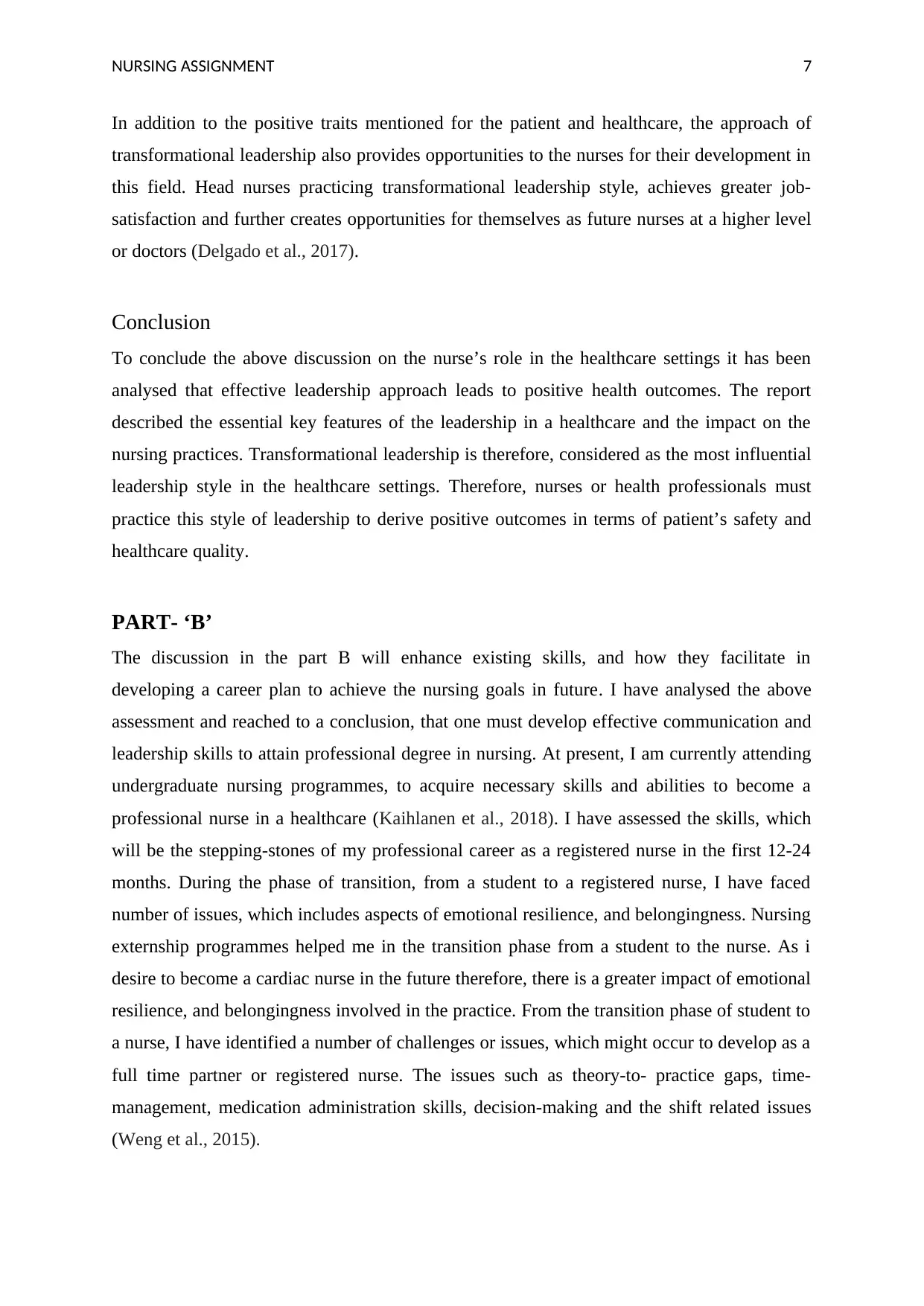
NURSING ASSIGNMENT 7
In addition to the positive traits mentioned for the patient and healthcare, the approach of
transformational leadership also provides opportunities to the nurses for their development in
this field. Head nurses practicing transformational leadership style, achieves greater job-
satisfaction and further creates opportunities for themselves as future nurses at a higher level
or doctors (Delgado et al., 2017).
Conclusion
To conclude the above discussion on the nurse’s role in the healthcare settings it has been
analysed that effective leadership approach leads to positive health outcomes. The report
described the essential key features of the leadership in a healthcare and the impact on the
nursing practices. Transformational leadership is therefore, considered as the most influential
leadership style in the healthcare settings. Therefore, nurses or health professionals must
practice this style of leadership to derive positive outcomes in terms of patient’s safety and
healthcare quality.
PART- ‘B’
The discussion in the part B will enhance existing skills, and how they facilitate in
developing a career plan to achieve the nursing goals in future. I have analysed the above
assessment and reached to a conclusion, that one must develop effective communication and
leadership skills to attain professional degree in nursing. At present, I am currently attending
undergraduate nursing programmes, to acquire necessary skills and abilities to become a
professional nurse in a healthcare (Kaihlanen et al., 2018). I have assessed the skills, which
will be the stepping-stones of my professional career as a registered nurse in the first 12-24
months. During the phase of transition, from a student to a registered nurse, I have faced
number of issues, which includes aspects of emotional resilience, and belongingness. Nursing
externship programmes helped me in the transition phase from a student to the nurse. As i
desire to become a cardiac nurse in the future therefore, there is a greater impact of emotional
resilience, and belongingness involved in the practice. From the transition phase of student to
a nurse, I have identified a number of challenges or issues, which might occur to develop as a
full time partner or registered nurse. The issues such as theory-to- practice gaps, time-
management, medication administration skills, decision-making and the shift related issues
(Weng et al., 2015).
In addition to the positive traits mentioned for the patient and healthcare, the approach of
transformational leadership also provides opportunities to the nurses for their development in
this field. Head nurses practicing transformational leadership style, achieves greater job-
satisfaction and further creates opportunities for themselves as future nurses at a higher level
or doctors (Delgado et al., 2017).
Conclusion
To conclude the above discussion on the nurse’s role in the healthcare settings it has been
analysed that effective leadership approach leads to positive health outcomes. The report
described the essential key features of the leadership in a healthcare and the impact on the
nursing practices. Transformational leadership is therefore, considered as the most influential
leadership style in the healthcare settings. Therefore, nurses or health professionals must
practice this style of leadership to derive positive outcomes in terms of patient’s safety and
healthcare quality.
PART- ‘B’
The discussion in the part B will enhance existing skills, and how they facilitate in
developing a career plan to achieve the nursing goals in future. I have analysed the above
assessment and reached to a conclusion, that one must develop effective communication and
leadership skills to attain professional degree in nursing. At present, I am currently attending
undergraduate nursing programmes, to acquire necessary skills and abilities to become a
professional nurse in a healthcare (Kaihlanen et al., 2018). I have assessed the skills, which
will be the stepping-stones of my professional career as a registered nurse in the first 12-24
months. During the phase of transition, from a student to a registered nurse, I have faced
number of issues, which includes aspects of emotional resilience, and belongingness. Nursing
externship programmes helped me in the transition phase from a student to the nurse. As i
desire to become a cardiac nurse in the future therefore, there is a greater impact of emotional
resilience, and belongingness involved in the practice. From the transition phase of student to
a nurse, I have identified a number of challenges or issues, which might occur to develop as a
full time partner or registered nurse. The issues such as theory-to- practice gaps, time-
management, medication administration skills, decision-making and the shift related issues
(Weng et al., 2015).
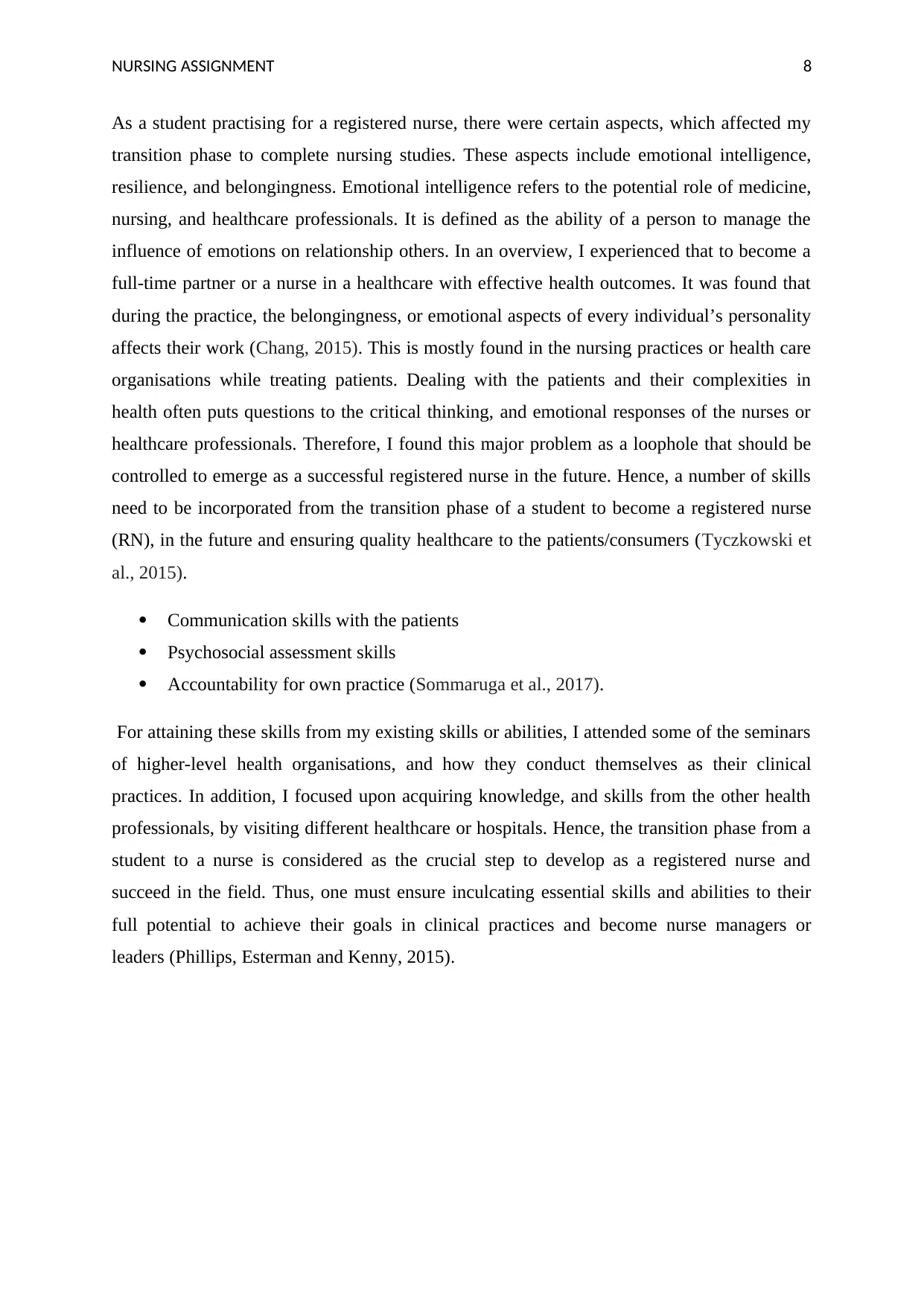
NURSING ASSIGNMENT 8
As a student practising for a registered nurse, there were certain aspects, which affected my
transition phase to complete nursing studies. These aspects include emotional intelligence,
resilience, and belongingness. Emotional intelligence refers to the potential role of medicine,
nursing, and healthcare professionals. It is defined as the ability of a person to manage the
influence of emotions on relationship others. In an overview, I experienced that to become a
full-time partner or a nurse in a healthcare with effective health outcomes. It was found that
during the practice, the belongingness, or emotional aspects of every individual’s personality
affects their work (Chang, 2015). This is mostly found in the nursing practices or health care
organisations while treating patients. Dealing with the patients and their complexities in
health often puts questions to the critical thinking, and emotional responses of the nurses or
healthcare professionals. Therefore, I found this major problem as a loophole that should be
controlled to emerge as a successful registered nurse in the future. Hence, a number of skills
need to be incorporated from the transition phase of a student to become a registered nurse
(RN), in the future and ensuring quality healthcare to the patients/consumers (Tyczkowski et
al., 2015).
Communication skills with the patients
Psychosocial assessment skills
Accountability for own practice (Sommaruga et al., 2017).
For attaining these skills from my existing skills or abilities, I attended some of the seminars
of higher-level health organisations, and how they conduct themselves as their clinical
practices. In addition, I focused upon acquiring knowledge, and skills from the other health
professionals, by visiting different healthcare or hospitals. Hence, the transition phase from a
student to a nurse is considered as the crucial step to develop as a registered nurse and
succeed in the field. Thus, one must ensure inculcating essential skills and abilities to their
full potential to achieve their goals in clinical practices and become nurse managers or
leaders (Phillips, Esterman and Kenny, 2015).
As a student practising for a registered nurse, there were certain aspects, which affected my
transition phase to complete nursing studies. These aspects include emotional intelligence,
resilience, and belongingness. Emotional intelligence refers to the potential role of medicine,
nursing, and healthcare professionals. It is defined as the ability of a person to manage the
influence of emotions on relationship others. In an overview, I experienced that to become a
full-time partner or a nurse in a healthcare with effective health outcomes. It was found that
during the practice, the belongingness, or emotional aspects of every individual’s personality
affects their work (Chang, 2015). This is mostly found in the nursing practices or health care
organisations while treating patients. Dealing with the patients and their complexities in
health often puts questions to the critical thinking, and emotional responses of the nurses or
healthcare professionals. Therefore, I found this major problem as a loophole that should be
controlled to emerge as a successful registered nurse in the future. Hence, a number of skills
need to be incorporated from the transition phase of a student to become a registered nurse
(RN), in the future and ensuring quality healthcare to the patients/consumers (Tyczkowski et
al., 2015).
Communication skills with the patients
Psychosocial assessment skills
Accountability for own practice (Sommaruga et al., 2017).
For attaining these skills from my existing skills or abilities, I attended some of the seminars
of higher-level health organisations, and how they conduct themselves as their clinical
practices. In addition, I focused upon acquiring knowledge, and skills from the other health
professionals, by visiting different healthcare or hospitals. Hence, the transition phase from a
student to a nurse is considered as the crucial step to develop as a registered nurse and
succeed in the field. Thus, one must ensure inculcating essential skills and abilities to their
full potential to achieve their goals in clinical practices and become nurse managers or
leaders (Phillips, Esterman and Kenny, 2015).
⊘ This is a preview!⊘
Do you want full access?
Subscribe today to unlock all pages.

Trusted by 1+ million students worldwide
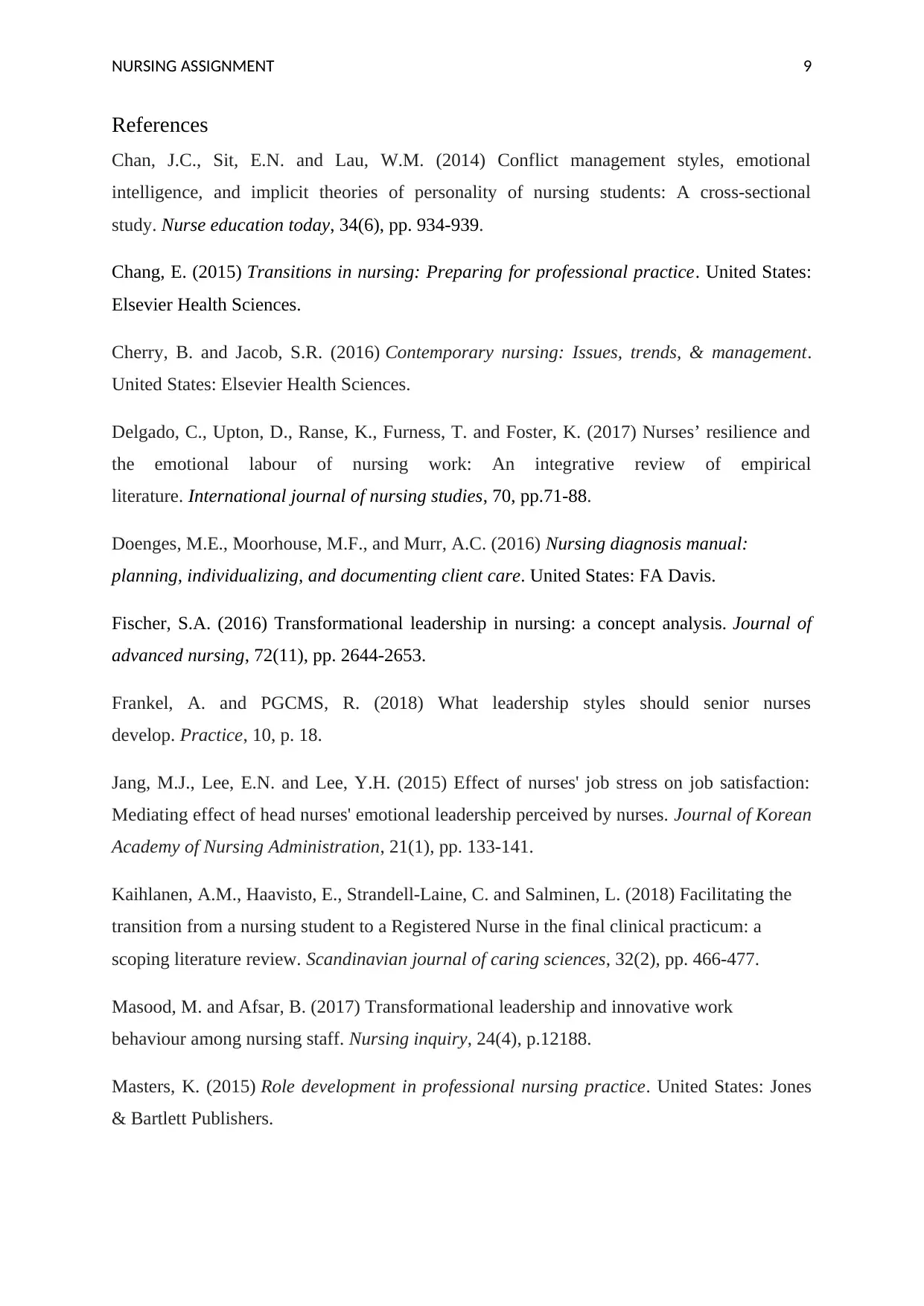
NURSING ASSIGNMENT 9
References
Chan, J.C., Sit, E.N. and Lau, W.M. (2014) Conflict management styles, emotional
intelligence, and implicit theories of personality of nursing students: A cross-sectional
study. Nurse education today, 34(6), pp. 934-939.
Chang, E. (2015) Transitions in nursing: Preparing for professional practice. United States:
Elsevier Health Sciences.
Cherry, B. and Jacob, S.R. (2016) Contemporary nursing: Issues, trends, & management.
United States: Elsevier Health Sciences.
Delgado, C., Upton, D., Ranse, K., Furness, T. and Foster, K. (2017) Nurses’ resilience and
the emotional labour of nursing work: An integrative review of empirical
literature. International journal of nursing studies, 70, pp.71-88.
Doenges, M.E., Moorhouse, M.F., and Murr, A.C. (2016) Nursing diagnosis manual:
planning, individualizing, and documenting client care. United States: FA Davis.
Fischer, S.A. (2016) Transformational leadership in nursing: a concept analysis. Journal of
advanced nursing, 72(11), pp. 2644-2653.
Frankel, A. and PGCMS, R. (2018) What leadership styles should senior nurses
develop. Practice, 10, p. 18.
Jang, M.J., Lee, E.N. and Lee, Y.H. (2015) Effect of nurses' job stress on job satisfaction:
Mediating effect of head nurses' emotional leadership perceived by nurses. Journal of Korean
Academy of Nursing Administration, 21(1), pp. 133-141.
Kaihlanen, A.M., Haavisto, E., Strandell‐Laine, C. and Salminen, L. (2018) Facilitating the
transition from a nursing student to a Registered Nurse in the final clinical practicum: a
scoping literature review. Scandinavian journal of caring sciences, 32(2), pp. 466-477.
Masood, M. and Afsar, B. (2017) Transformational leadership and innovative work
behaviour among nursing staff. Nursing inquiry, 24(4), p.12188.
Masters, K. (2015) Role development in professional nursing practice. United States: Jones
& Bartlett Publishers.
References
Chan, J.C., Sit, E.N. and Lau, W.M. (2014) Conflict management styles, emotional
intelligence, and implicit theories of personality of nursing students: A cross-sectional
study. Nurse education today, 34(6), pp. 934-939.
Chang, E. (2015) Transitions in nursing: Preparing for professional practice. United States:
Elsevier Health Sciences.
Cherry, B. and Jacob, S.R. (2016) Contemporary nursing: Issues, trends, & management.
United States: Elsevier Health Sciences.
Delgado, C., Upton, D., Ranse, K., Furness, T. and Foster, K. (2017) Nurses’ resilience and
the emotional labour of nursing work: An integrative review of empirical
literature. International journal of nursing studies, 70, pp.71-88.
Doenges, M.E., Moorhouse, M.F., and Murr, A.C. (2016) Nursing diagnosis manual:
planning, individualizing, and documenting client care. United States: FA Davis.
Fischer, S.A. (2016) Transformational leadership in nursing: a concept analysis. Journal of
advanced nursing, 72(11), pp. 2644-2653.
Frankel, A. and PGCMS, R. (2018) What leadership styles should senior nurses
develop. Practice, 10, p. 18.
Jang, M.J., Lee, E.N. and Lee, Y.H. (2015) Effect of nurses' job stress on job satisfaction:
Mediating effect of head nurses' emotional leadership perceived by nurses. Journal of Korean
Academy of Nursing Administration, 21(1), pp. 133-141.
Kaihlanen, A.M., Haavisto, E., Strandell‐Laine, C. and Salminen, L. (2018) Facilitating the
transition from a nursing student to a Registered Nurse in the final clinical practicum: a
scoping literature review. Scandinavian journal of caring sciences, 32(2), pp. 466-477.
Masood, M. and Afsar, B. (2017) Transformational leadership and innovative work
behaviour among nursing staff. Nursing inquiry, 24(4), p.12188.
Masters, K. (2015) Role development in professional nursing practice. United States: Jones
& Bartlett Publishers.
Paraphrase This Document
Need a fresh take? Get an instant paraphrase of this document with our AI Paraphraser
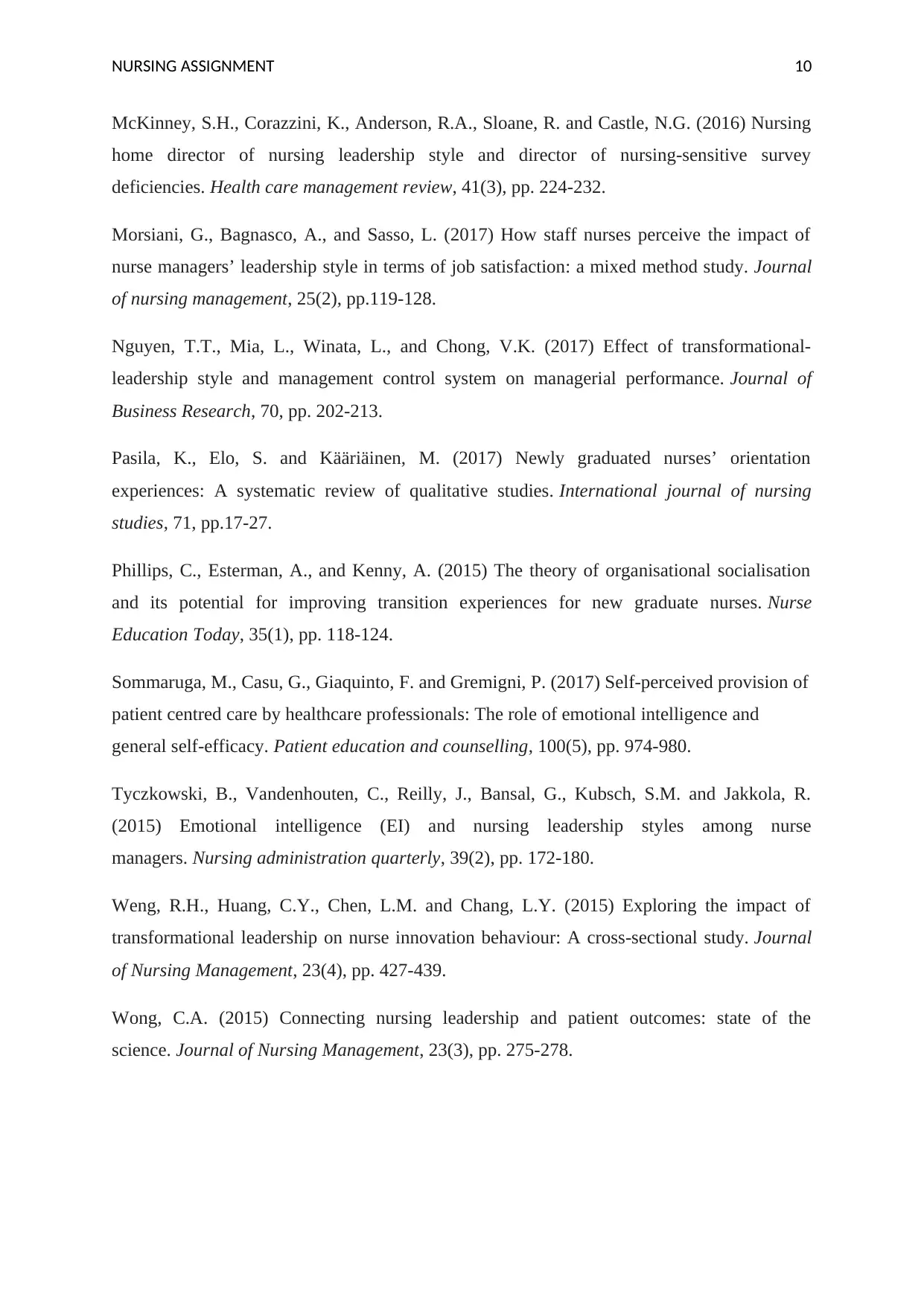
NURSING ASSIGNMENT 10
McKinney, S.H., Corazzini, K., Anderson, R.A., Sloane, R. and Castle, N.G. (2016) Nursing
home director of nursing leadership style and director of nursing-sensitive survey
deficiencies. Health care management review, 41(3), pp. 224-232.
Morsiani, G., Bagnasco, A., and Sasso, L. (2017) How staff nurses perceive the impact of
nurse managers’ leadership style in terms of job satisfaction: a mixed method study. Journal
of nursing management, 25(2), pp.119-128.
Nguyen, T.T., Mia, L., Winata, L., and Chong, V.K. (2017) Effect of transformational-
leadership style and management control system on managerial performance. Journal of
Business Research, 70, pp. 202-213.
Pasila, K., Elo, S. and Kääriäinen, M. (2017) Newly graduated nurses’ orientation
experiences: A systematic review of qualitative studies. International journal of nursing
studies, 71, pp.17-27.
Phillips, C., Esterman, A., and Kenny, A. (2015) The theory of organisational socialisation
and its potential for improving transition experiences for new graduate nurses. Nurse
Education Today, 35(1), pp. 118-124.
Sommaruga, M., Casu, G., Giaquinto, F. and Gremigni, P. (2017) Self-perceived provision of
patient centred care by healthcare professionals: The role of emotional intelligence and
general self-efficacy. Patient education and counselling, 100(5), pp. 974-980.
Tyczkowski, B., Vandenhouten, C., Reilly, J., Bansal, G., Kubsch, S.M. and Jakkola, R.
(2015) Emotional intelligence (EI) and nursing leadership styles among nurse
managers. Nursing administration quarterly, 39(2), pp. 172-180.
Weng, R.H., Huang, C.Y., Chen, L.M. and Chang, L.Y. (2015) Exploring the impact of
transformational leadership on nurse innovation behaviour: A cross‐sectional study. Journal
of Nursing Management, 23(4), pp. 427-439.
Wong, C.A. (2015) Connecting nursing leadership and patient outcomes: state of the
science. Journal of Nursing Management, 23(3), pp. 275-278.
McKinney, S.H., Corazzini, K., Anderson, R.A., Sloane, R. and Castle, N.G. (2016) Nursing
home director of nursing leadership style and director of nursing-sensitive survey
deficiencies. Health care management review, 41(3), pp. 224-232.
Morsiani, G., Bagnasco, A., and Sasso, L. (2017) How staff nurses perceive the impact of
nurse managers’ leadership style in terms of job satisfaction: a mixed method study. Journal
of nursing management, 25(2), pp.119-128.
Nguyen, T.T., Mia, L., Winata, L., and Chong, V.K. (2017) Effect of transformational-
leadership style and management control system on managerial performance. Journal of
Business Research, 70, pp. 202-213.
Pasila, K., Elo, S. and Kääriäinen, M. (2017) Newly graduated nurses’ orientation
experiences: A systematic review of qualitative studies. International journal of nursing
studies, 71, pp.17-27.
Phillips, C., Esterman, A., and Kenny, A. (2015) The theory of organisational socialisation
and its potential for improving transition experiences for new graduate nurses. Nurse
Education Today, 35(1), pp. 118-124.
Sommaruga, M., Casu, G., Giaquinto, F. and Gremigni, P. (2017) Self-perceived provision of
patient centred care by healthcare professionals: The role of emotional intelligence and
general self-efficacy. Patient education and counselling, 100(5), pp. 974-980.
Tyczkowski, B., Vandenhouten, C., Reilly, J., Bansal, G., Kubsch, S.M. and Jakkola, R.
(2015) Emotional intelligence (EI) and nursing leadership styles among nurse
managers. Nursing administration quarterly, 39(2), pp. 172-180.
Weng, R.H., Huang, C.Y., Chen, L.M. and Chang, L.Y. (2015) Exploring the impact of
transformational leadership on nurse innovation behaviour: A cross‐sectional study. Journal
of Nursing Management, 23(4), pp. 427-439.
Wong, C.A. (2015) Connecting nursing leadership and patient outcomes: state of the
science. Journal of Nursing Management, 23(3), pp. 275-278.
1 out of 11
Related Documents
Your All-in-One AI-Powered Toolkit for Academic Success.
+13062052269
info@desklib.com
Available 24*7 on WhatsApp / Email
![[object Object]](/_next/static/media/star-bottom.7253800d.svg)
Unlock your academic potential
Copyright © 2020–2025 A2Z Services. All Rights Reserved. Developed and managed by ZUCOL.





